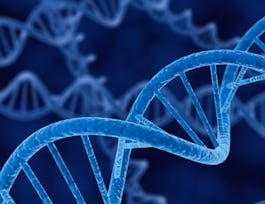Genomics for Law provides a unique framework to review the history and basics of genomics research as well as explore how genomics has, and will continue to, interact with the law.


Genomics for Law
Taught in English
Some content may not be translated
8,261 already enrolled
(138 reviews)
Details to know

Add to your LinkedIn profile
2 quizzes
See how employees at top companies are mastering in-demand skills


Earn a career certificate
Add this credential to your LinkedIn profile, resume, or CV
Share it on social media and in your performance review

There are 10 modules in this course
In this module, you will review what genomics is and discuss the relationship of genomics to the law. You will review the basic structure and function of the genome, the vocabulary used to describe its components, and understand how technology has and will continue to influence genomics, as well as how genomics is used in a variety of fields including healthcare, food security, energy, and law.
What's included
10 videos5 readings1 discussion prompt1 plugin
In this module, you will discuss the relationship of genomics to criminal law, how genetic evidence and genomic defenses currently operate in the criminal justice system and explore how fully allowing genetic evidence and genomic defenses might improve or harm criminal law. You will understand how criminal law might or might not recognize genomics as a defense, review types of changes needed in criminal law to accommodate genetic evidence, and examine how changes in the criminal law, to accommodate genetic evidence and defenses, could impact criminal law.
What's included
16 videos1 reading
In this module, you will explore how private individuals' genomes are in a criminal law context, how DNA is examined and processed in criminal investigations, and examine under what circumstances individuals' genomes are protected from access by the government in a criminal law context. You will also recognize under which circumstances the government has an interest in individuals' genomes in a criminal law context and review the basics of the CODIS STRs (Combined DNA Indexing System).
What's included
20 videos1 reading
In this module, you will learn about how genomics is used to estimate ancestry and predict physical appearance or traits in criminal investigations, and review the current evidentiary standards for utilizing genetic evidence. You will also examine the scientific viability of using genomics to estimate phenotypic traits, understand the accuracy of genetic estimates for ancestry and phenotypic traits, review the current evidentiary standards under Frye and Daubert, and identify the best methods to utilize genomics evidence under current legal evidentiary standards.
What's included
19 videos1 reading
In this module, you will review the history, economic, and legal reasoning behind intellectual property protection. You will then examine the basic requirements to obtain a patent, and identify which types of biological materials or processes are patent eligible using current case law. Additionally, comparative intellectual property legal regimes will be introduced.
What's included
16 videos1 reading
In this module, you will explore issues related to genomics that arise in Tort Law. You will examine some of the issues that can arise against medical practitioners as well as explore the implications of genomics in toxic tort cases.
What's included
7 videos1 reading
In this module, you will investigate the major issues related to privacy and genomics and how the privacy of genomic information is regulated as well as the interactions between major genomic privacy regulations. You will also examine the penalties for violation of genomic privacy regulations.
What's included
9 videos
In this module, you will consider some of the legal and ethical questions that have arisen in genomics research and the legal requirements of informed consent. You will also review major court decisions involving genomics research, treatment, and informed consent, examine the legal evolution and current requirements of informed consent, and explore the legal and ethical quandaries in genomics and its research.
What's included
9 videos
Complete the final assessment to pass the course and receive a Course Certificate. Anyone who is taking this course as a general Coursera learner (not for CLE credit) should complete the Course Content Quiz. Lawyers taking this course for continued legal education (CLE) credit MUST complete the Course Evaluation Form.
What's included
1 reading2 quizzes
Optionally, please complete the end of course survey.
What's included
1 plugin
Instructors


Recommended if you're interested in Law

Johns Hopkins University

Coursera Project Network

Google Cloud

American Museum of Natural History
Why people choose Coursera for their career




Learner reviews
Showing 3 of 138
138 reviews
- 5 stars
82.85%
- 4 stars
15%
- 3 stars
0.71%
- 2 stars
0.71%
- 1 star
0.71%

Open new doors with Coursera Plus
Unlimited access to 7,000+ world-class courses, hands-on projects, and job-ready certificate programs - all included in your subscription
Advance your career with an online degree
Earn a degree from world-class universities - 100% online
Join over 3,400 global companies that choose Coursera for Business
Upskill your employees to excel in the digital economy
Frequently asked questions
For questions about CLE credit, please contact Carolyn Turner at carolynt@illinois.edu
Access to lectures and assignments depends on your type of enrollment. If you take a course in audit mode, you will be able to see most course materials for free. To access graded assignments and to earn a Certificate, you will need to purchase the Certificate experience, during or after your audit. If you don't see the audit option:
The course may not offer an audit option. You can try a Free Trial instead, or apply for Financial Aid.
The course may offer 'Full Course, No Certificate' instead. This option lets you see all course materials, submit required assessments, and get a final grade. This also means that you will not be able to purchase a Certificate experience.
When you purchase a Certificate you get access to all course materials, including graded assignments. Upon completing the course, your electronic Certificate will be added to your Accomplishments page - from there, you can print your Certificate or add it to your LinkedIn profile. If you only want to read and view the course content, you can audit the course for free.


